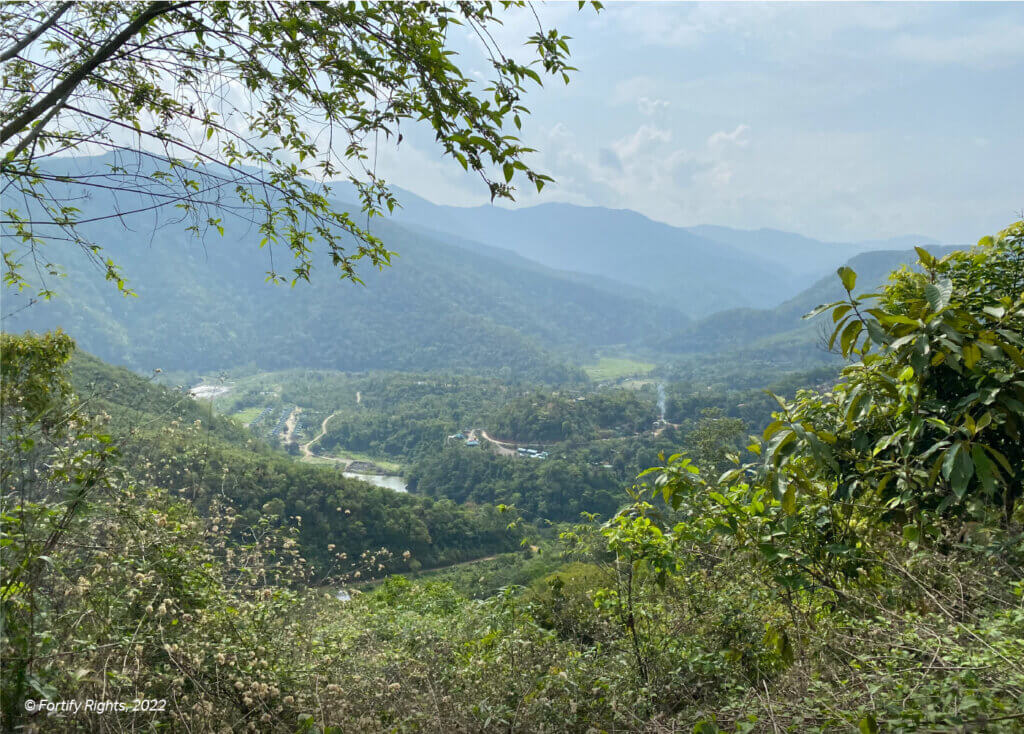India: Close Airspace to Myanmar Junta Air Force
12 January 2023

Junta reportedly bombs Indian territory in fresh attacks on Chin Army
(BANGKOK, January 12, 2023)—The Government of India should prevent Myanmar-junta fighter jets from accessing Indian airspace and take measures to protect ethnic-Chin and Indian civilians in border areas, said Fortify Rights today. On Tuesday and Wednesday, the Myanmar junta air force dropped bombs on both sides of the Myanmar-India border, killing five ethnic-Chin opposition soldiers and destroying civilian structures.
“New Delhi shouldn’t tolerate the junta’s incursions on its airspace, and Indian authorities should do everything in their power to ensure the security of civilians and border areas,” said Matthew Smith, Chief Executive Officer of Fortify Rights. “India should be aware of the junta’s habit of violating its neighbors’ airspaces and terrorizing civilian populations and take action accordingly.”
The attacks reportedly began on January 10 at around 3:30 p.m., targeting Camp Victoria—the headquarters of the Chin National Front (CNF), an ethnic resistance organization—located in Myanmar’s Chin State, which abuts India’s Mizoram State. The bombing reportedly destroyed civilian housing and a health facility located inside Camp Victoria and killed five CNF soldiers, including two women.
Junta forces also reportedly dropped two bombs on the Indian side of the border, near Farkawn village in Mizoram State’s Champhai District, where thousands of ethic-Chin refugees have sought protection. No one was reported injured in Farkawn.

Leaked junta documents shared by the Chin Human Rights Organization on social media in November 2022 exposed alleged plans by the Myanmar junta to launch airstrikes on Camp Victoria. One document titled “Target List of CNF Headquarter” listed dormitories of soldiers, training facilities, leaders’ houses as well as civilian residences, hospitals, churches, and schools.
Anticipating potential attacks, in November 2022, a senior-ranking official in the CNF told Fortify Rights that the CNF had requested military support from the Indian government to increase security on the Myanmar-India border.
A few months back, in 2022, the Assam Rifles—border guard forces responsible for providing ground security in India’s Mizoram and Manipur states at the Myanmar border—withdrew from its post overseeing the Tiau River, which borders Myanmar in India’s Farkawn village. The junta bombed locations near the Tiau River this week.
In recent months, incursions by the Myanmar junta air force into the sovereign air space of both Thailand and Bangladesh have been reported.
According to the Royal Thai Air Force, on June 30, 2022, Myanmar junta aircraft crossed into Thai airspace over Phop Phra District in Tak Province, which is located on the Thailand-Myanmar border. Thai authorities reportedly detected a MiG-29 fighter jet belonging to the Myanmar military in Thai airspace, more than three miles into Thai territory. Reportedly, the incursion of the fighter jet and loud explosions across the border created panic among villagers in Thailand, prompting them to shelter in bunkers. In response to the junta’s incursions, Thai authorities deployed two F-16 fighter jets. Similarly, in late August 2022, the junta air force reportedly fired two rockets that landed less than 400 feet into Bangladeshi territory.
“The Myanmar junta is a threat to peace, including to the Myanmar people and civilian populations in neighboring states,” said Matthew Smith. “India must not allow the junta to continue destabilizing the region by using Indian airspace in its attacks and should support efforts to hold the junta accountable for its crimes.”
In the first six months after the Myanmar military launched its coup d’état, Fortify Rights and the Schell Center at Yale Law School documented crimes against humanity perpetrated by the military and police in Myanmar, including murder, imprisonment, torture, persecution, and enforced disappearances.
The junta’s systematic attack against the civilian population has forced tens of thousands from Chin State in Myanmar to Mizoram State, India. Although the Indian government reportedly ordered border security forces and the chief secretaries of the four northeastern states bordering Myanmar to prevent refugee inflows from Myanmar, as of July 2022, Mizoram State continues to host more than 30,000 Chin refugees. An estimated one-third of those sheltering in Mizoram State are located in the recently bombed Champhai District.
International humanitarian law—also known as the laws of war—is applicable to the situation in Chin State, which constitutes a non-international armed conflict. The laws of war are primarily defined by the Geneva Conventions, which provide fundamental rules to regulate the conduct of armed conflict and expressly guarantee the protection of civilians “against all acts of violence.” Under the laws of war, parties involved in the conflict are required to distinguish civilians and “civilian objects,” such as homes and hospitals that are not being used for military purposes, from combatants and “military objectives.” Both direct attacks and indiscriminate attacks that strike civilians and “civilian objects” are prohibited by the laws of war. “Intentionally directing attacks against the civilian population” is further considered a serious violation of international humanitarian law that may constitute a war crime.
The Myanmar junta’s nationwide attacks on civilian populations amount to serious violations of international law and should be addressed by the United Nations Security Council, said Fortify Rights.
The U.N. Security Council has recognized that military coups, mass atrocity crimes, and cross-border refugee crises can threaten international peace and security and be a context for the Security Council to invoke its authority under Chapter VII of the U.N. Charter.
On December 21, 2022, the U.N. Security Council adopted a historic resolution, denouncing human rights violations by the Myanmar military since the February 1, 2021 coup d’état. This was the first Security Council resolution on Myanmar since the country became independent in 1948, and while important, it failed to mandate action.
The Security Council should invoke its authority and pass a resolution to issue a global arms embargo against the Myanmar junta and refer the situation to the International Criminal Court, said Fortify Rights.
The Government of India should coordinate with Myanmar’s neighbors and other U.N. member states to block imports of aviation fuel to Myanmar, which would help prevent the junta’s deadly air strikes on civilian populations. The Indian government should also authorize cross-border humanitarian aid for internally displaced persons in Myanmar, and deprive the Myanmar military junta of weapons, dual-use technology, revenue, and political recognition, said Fortify Rights.
View the original
Announcements
28 February 2025
Asian NGO Network on National Human Rights Institutions , CSO Working Group on Independent National Human Rights Institution (Burma/Myanmar)
Open letter: Removal of the membership of the dis-accredited Myanmar National Human Rights Commission from the Southeast Asia National Human Rights Institution Forum

Progressive Voice is a participatory rights-based policy research and advocacy organization rooted in civil society, that maintains strong networks and relationships with grassroots organizations and community-based organizations throughout Myanmar. It acts as a bridge to the international community and international policymakers by amplifying voices from the ground, and advocating for a rights-based policy narrative.